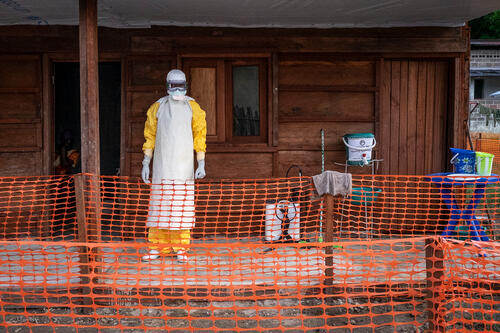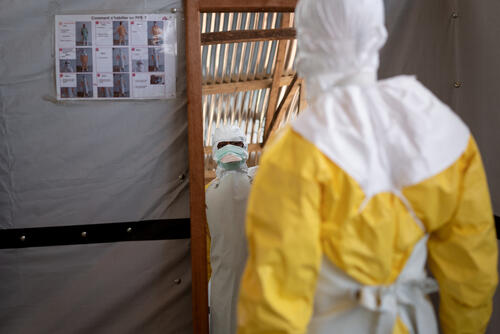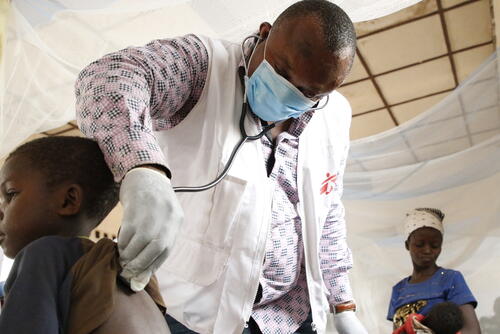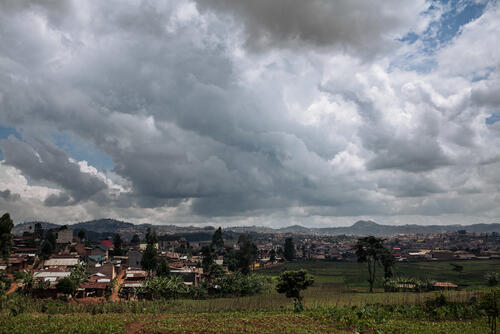Eleventh outbreak declared over in Équateur province
After lasting for nearly six months, and infecting 130 people, the Democratic Republic of Congo (DRC) declared its eleventh Ebola outbreak over on 18 November 2020. The outbreak claimed the lives of 55 people and spread in the country’s northwest, in Équateur province, in often remote and extremely difficult-to-access villages.
The eleventh Ebola outbreak in DRC since records began was declared on 1 June 2020, following the revelation of new cases of Ebola in Équateur province, in the country’s northwest. Less than two years since the last outbreak, DRC’s ninth, of the disease ended in Équateur province - and just weeks before the country declared over its long-running tenth outbreak, in North Kivu and Ituri provinces - authorities reported over a dozen people with either confirmed or suspected cases in the city of Mbandaka and surrounding area.
Although this outbreak is now over, it is important to maintain vigilance against a resurgence of Ebola.
Final figures on 11th outbreak - information as of 18 November 2020; figures provided by DRC Ministry of Health via WHO.
130
13
118
118
55
55
Summary of eleventh outbreak
The response to this eleventh Ebola epidemic did not face the kind of security challenges that affected the response to the tenth Ebola outbreak.
On 9 June, WHO announced that there was no link between the tenth outbreak and the eleventh outbreak; they also established that the virus in the eleventh outbreak was distinct from that which circulated in Équateur province during the country's ninth outbreak in 2018.
The outbreak progressed slowly, and was declared over 42 days after the last negative test of the last known patient. However, 13 out of Équateur province’s 18 health zones recorded cases, and patients were scattered over a vast area, in often very remote villages.
Compared to the North Kivu/Ituri epidemic – which saw a case mortality rate of 67 per cent – the outbreak in Équateur province recorded mortality levels of 43 per cent; still high, but significantly lower than in the tenth outbreak.
Patients in the eleventh outbreak benefitted from the scientific progress that’s been made in recent years, with the vaccines, and curative treatments now available. According to WHO, over 40,000 people were vaccinated using the rVSV-ZEBOV vaccine.
Area
The area posed significant logistical challenges. Équateur province is the same size as Iceland (nearly 104,000 km2), with some health areas only accessible by river using canoes or after hours of difficult transport by rough roads through the forest. Only one helicopter was available to humanitarian organisations to move around the region.
Villages are scattered in the area, with often large distances between them, and many are extremely remote. MSF teams, with equipment, often needed to reach these places by traversing lakes or navigating rivers.
The province mostly lacks major long-distance roads, so communities move along the meandering waterways of the area as they go from one small village to another; therefore, we saw sporadic cases that didn’t appear to spread in a linear way, as we saw during the North Kivu/Ituri outbreak.
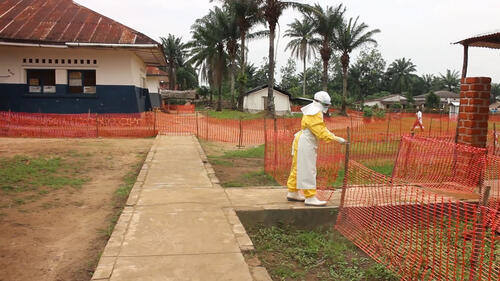
MSF response to eleventh outbreak
Following the declaration of the eleventh Ebola virus outbreak in DRC by the Ministry of Health (MoH) on 1 June, MSF teams decided on a decentralised, community-focused approach. It was based on empowering decentralised micro-structures for Ebola care in local healthcare facilities, close to patients and communities.
The approach was instead to engage mostly local health workers, supporting people at the community level to conduct local case surveillance, and limit the use of large, centralised facilities and personnel from outside the community. We supported the healthcare system in Équateur province to identify, isolate and treat patients with Ebola, minimising the need for a parallel system.
At the height of our response, MSF teams were working in six health zones: Bolomba, Bikoro, Monieka, Ingende, Lolanga Mampoko, and Lotumbe. In total, we provided care to patients in across nine treatment and isolations centres.
Previous activities
Bolomba health zone
- provided support to the Ebola treatment centre at the general hospital
- set up two small treatment and isolation centres in the remote health areas of Boso Mondomba and Yuli.
Monieka and Bikoro health zones
- provided support to four small care and isolation structures in difficult-to-access health areas.
Lotumbe and Ingende health zones
- Working with the MoH and WHO, investigated whenever a new case was reported for contact tracing
- Vaccinated the patient and their contact
- Established – in cooperation with the community – health zone alerts to potential cases
Lolanga Mampoko health zone
- Short-term support was provided to health facilities through medical and water and sanitation briefings,
- Supported with triage and health promotion activities
- Donated medicines and medical items
Across the six zones
- our teams are supporting community surveillance
- providing rapid treatment to patients living in hard-to-reach areas
- Our health promotion teams are also supporting those of the Ministry of Health
- An MSF epidemiologist worked alongside MoH, WHO and MSF health promotion teams
- Developed a triage algorithm, in collaboration with MSF’s epidemiological arm, Epicentre, to reduce people with suspected Ebola being admitted to ETCs or isolation units, preventing cross-contamination
We are also supporting health centres in the hotspots and on the major axes of Bolomba and Bikoro, with non-Ebola health needs.
Summary - tenth outbreak
Democratic Republic of Congo (DRC) declared their tenth outbreak of Ebola in 40 years on 1 August 2018. The outbreak was centred in the northeast of the country, in North Kivu and Ituri provinces; cases had also been reported in South Kivu, and some across the border in Uganda.
During the tenth outbreak, 3,470 cases were recorded; 2,287 people sadly lost their lives. It is by far the country's largest-ever Ebola outbreak, and is also the second-biggest Ebola epidemic ever recorded, behind the West Africa outbreak of 2014-2016.
The last Ebola patient was discharged from the Beni ETC on 14 May 2020; after recording no new cases for 42 consecutive days - twice the length of the disease's incubation period of 21 days - the DRC Minister of Health declared the outbreak in the northeast over on 25 June 2020.
For a full summary of the tenth Ebola outbreak, read more here.



